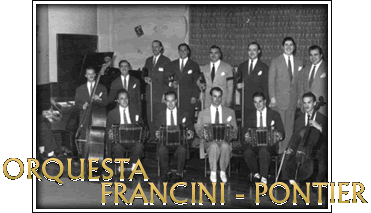
The 40s turned out a never-ending factory of young artists, embarked on a recreation and renewal of the city music. Consequently, musicians, singers, lyricists, composers and talented arrangers appear, who link the preceding tango generations of the 20s and the 30s, still fashionable like the cases of Fresedo, Canaro, Firpo, Di Sarli, among others, with a young blood, avid and enthusiastic, of the level of Troilo, Pugliese, D'Agostino, D'Arienzo, Demare, Maderna and many more that now are not worth mentioning.
Among them, one orchestra: the team Francini-Pontier, a magic communion of two extraordinary musicians, identified with an innovative style but, at the same time, quite danceable.
In 1939, Enrique Francini, as violinist, and Armando Pontier, in the bandoneon section, joined the orchestra that had recently been put together by Miguel Caló with other juvenile talents, such as Osmar Maderna and Domingo Federico, piano and lead bandoneon, respectively.
Previously, both boys, born in Zarate, (a city on the coast of the Paraná River, 100 km. North from Buenos Aires), had been together in the orchestra led by Juan Ehlert, also from Zárate and responsible of their move to the Capital, to play on Radio Prieto in 1937.
The two musicians were developing in the Caló orchestra and remained in it for six years of uninterrupted success.
In 1945, they both decided to try a new stage by putting together an orchestra that would become a true icon of the decade. They made their debut on September 1 at the opening of "Tango Bar", a mythical local on 1200 Corrientes Avenue, between Libertad and Talcahuano streets, in the heart of Buenos Aires downtown.
The line-up was: Juan José Paz on piano; in the bandoneon section, Pontier, Ángel Domínguez, Nicolás Paracino and Juan Salomone; on violins, Francini, Pedro Sarmiento, Aquiles Aguilar and Mario Lalli; Rafael del Bagno on double bass and the voices of Raúl Berón and Alberto Podestá.
Immediately, they were hired by Radio El Mundo and the Victor label released their first recording: "Sirva otra copa", written by Arturo Gallucci and José Rótulo, and on the other side: "Margo" by Pontier and Homero Expósito, both featuring the singer Alberto Podestá. (record Victor 60-0877, January 29, 1946).
Since then, the consecration and recognition of the Buenos Aires young fans, that followed them with enthusiasm at the balls at the Piccadilly and Ebro Bar.
Argentino Galván joined them to write the arrangements and in 1947 they were a boom on the stage of the Tibidabo cabaret, with a style consolidated and a personal and unmistakable sound.
Of common accord and friendly, they split in 1955. About that, Jorge Palacio told us: «Not only it was a friendly breaking up, but also it turned out beneficial for our tango since, out of that dismembering, new and important orchestras were born».
The recorded output of the team Francini-Pontier is of an excellent quality. They recorded 130 numbers, among which the standouts are "Remolino" with Raúl Berón on vocals, a real wonder; "Pichuco", instrumental; "Alma de bohemio", with Alberto Podestá; "Nunca tuvo novio", with Roberto Rufino, for me, the best rendition of this gem penned by Bardi and Cadícamo; "Claveles blancos", with Rufino; "El ciruja", first recording of Julio Sosa in Argentina; "A los amigos", instrumental; "Princesa del fango", with Sosa; "A la guardia vieja", instrumental; "Olvidao", also by Sosa; "Por una muñeca", with Roberto Florio: "Tema otoñal", by Francini, and "Chiqué", both instrumentals.
The Francini-Pontier orchestra had excellent singers, who besides were at the peak of their career, such were the cases of Alberto Podestá, Raúl Berón, Roberto Rufino and Julio Sosa.
Other outstanding voices sang as well: Roberto Florio, Héctor Montes, Pablo Moreno, Mario Lagos and Luis Correa.
Mer musik »| ur Kalendariet |
| Nyårsfest i Alvik - New Year´s party - Fiesta de Año Nuevo | ||
| Milonga på Chicago med DJ Dennis |
| Milonga på Chicago |
| Milonga på Chicago |
| Måndagspractica i Kungsholmens Kulturhus |
| ur Aktuellt |
Nyårsfest! Visst blir det tango till nyår också 2025! Bered dig ... »
| ur Öppet Forum - senaste Ämnena |
Reklam för andra arrangörers evenemang »
Reklam för Tango Nortes evenemang »
(Logga in för övriga forum)